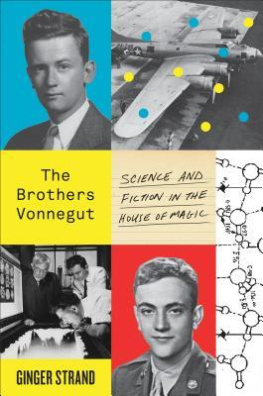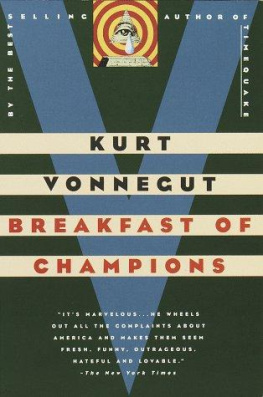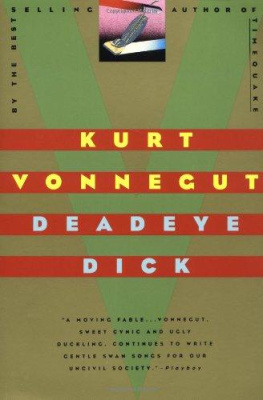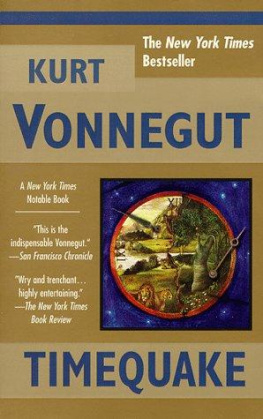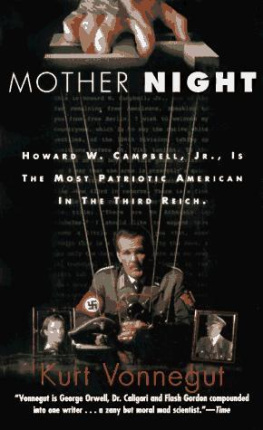
Thank you for buying this
Farrar, Straus and Giroux ebook.
To receive special offers, bonus content,
and info on new releases and other great reads,
sign up for our newsletters.

Or visit us online at
us.macmillan.com/newslettersignup
For email updates on the author, click here.
The author and publisher have provided this e-book to you for your personal use only. You may not make this e-book publicly available in any way. Copyright infringement is against the law. If you believe the copy of this e-book you are reading infringes on the authors copyright, please notify the publisher at: us.macmillanusa.com/piracy.
The most beautiful thing we can experience is the mysterious. It is the source of all true art and science.
Albert Einstein
Private First Class Vonnegut prepared to die.
At the bottom of a snowy hollow, he fixed his bayonet and waited, huddled in a group of roughly fifty soldiers. Their unit, the 423rd, had been at battle for three days, since December 16. Theyd been lost for most of it. They must be somewhere in Luxembourg, someone said. Now they were surrounded, herded into a small depression in the unfamiliar land. Kurt hunched into his coathe had a tall mans habit of hunchingbut he couldnt get warm. That December1944was one of the coldest and wettest ever recorded in Europe.
The Germans were shouting at them. Kurt and the other soldiers couldnt see them, but they could hear accented voices telling the Americans to give up. They were surrounded, the Nazis said. It was useless to resist. The men bunched together, pointing their bayonets out the way soldiers do in the movies. Time slowed down. Kurt had always liked being part of a clan, and here, at the end of the line, the soldiers became almost one being, a big porcupine bristling with steel quills. For a few minutes, it was kind of nice.
He had waded ashore to the European theater less than a month earlier and ground to the front in a truck buffeted by sleet. He was still somewhat in shock. His mother had died of a drug overdosewas it a suicide? an accident?just before he shipped out. The sadness hung thick over his departure, complicating and deepening his fear. He longed for the feeling that someone loved him, followed his every move with boundless devotion. He hadnt realized how much he needed that until his mother was gone.
Still, for the first time in his life he felt beyond reproach. No longer a flunking chemistry student or a college dropout, he was where he was supposed to be, a soldier putting his life on the line. He was now the sort of person honored in the grandiose Soldiers and Sailors Monument at the center of his hometown, Indianapolis. Not even his big brother, Bernard, could say that much. Bernie, the A student, the brilliant scientist, the MIT man like their father. The one who launched the chain of events that landed Kurt here, a pacifist about to be swallowed by war.
The Germans fired on the trees above the soldiers heads. Branches and splintered steel rained down. A couple of guys were hit. They might be dead. Twenty-five years later, Kurt would introduce a character named Edgar Derby to the world and describe his experience of this very battle. He would call what rained down on him the incredible artificial weather that Earthlings sometimes create for other Earthlings when they dont want those other Earthlings to inhabit Earth any more.
Come out, the Nazis ordered again. The Americans came out. When he saw the Germans, Kurt couldnt help but note their white snowsuits. That made so much more sense, he thought, than his absurd army drab. The Americans were always in olive, as if wars were never fought in white places, in white weather.
* * *
The battle had started three days earlier at 5:30 a.m., before dawn crept over the frozen landscape of Schnee Eifel, or Snow Mountain. They were manning a lightly defended spot along the old Westwall, a reinforcement ridge the Allies called the Siegfried Line. It was quiet: no one expected much to happen on this front. Then out of the predawn darkness came the attack, and it sounded like the sky falling in. For eighty miles along the Westwall, Allied soldiers woke up to German artillery raining down on them: fourteen-inch shells from railroad guns, the hacking cough and plunk of mortars, the high-pitched whistles of what the Americans called screaming meemies but the Germans called Nebelwerfer : fog throwers. The forest along the front was leveled as the Germans fired on trees. Even the Nazis were impressed by their own artillery storm. A hurricane of iron and fire, one German major called it.
For nearly an hour, the onslaught pounded the American troops. Then, suddenly, there was an eerie silence. As the soldiers tried to get their bearings, they heard a clank, and then they were lit like stage actors from the east. Through the dense fog, the Germans were flooding them with searchlightsa new intimidation tactic they called artificial moonlight. To the battered Allies, it felt as if the Nazis had commandeered control of nature. Finally, out of the white came snow monsters: German infantry.
Something big was happening, but no one knew what. Telephone lines were blasted; whole divisions lost contact with command. Strategists got garbled and patchy reports; some thought the barrage was merely a spoiling attack, a futile lashing out by an enemy who knew he was defeated. After all, the war was meant to be winding down. General Eisenhower had a standing bet with the British field marshal Montgomery that Europe would be won by Christmas. It took days before the Allied generals realized that a major offensive was under way and diverted troops to stop it.
In retrospect, it was clearly a mistake to man twenty-five miles of front with one Allied division. But the Germans were outnumbered and out-armed. Why would they launch an offensive? They had only one thing on their side: the Allies called it Hitlers weather.
In war, soldiers fight more than the enemy. They fight topography. They fight time. Most of all, they fight weather. Kublai Khan might have overrun Japan, but a typhoon destroyed half his ships. The Spanish Armada fell to Britain because of storms on the North Sea. Napoleon was especially unlucky in weather: he lost Waterloo because of a rainstorm, and his march on Russia was beaten back not by war craft but by winter.
In World War II, weather mattered more than ever. It was the first war in which airpower would be decisive, and the U.S. Army Air Forces were especially vulnerable to bad weather: cloud cover disrupted bombing runs; snow scrambled radio signals; icing forced planes to land. But weather could waylay the Navy too: the day Kurt woke up to the German attack on the western front, the Third Fleet faced a typhoon in the Pacific. The storm sank 3 destroyers, wrecked 146 aircraft on carriers, and killed 778 troops, racking up a higher death toll than any Japanese attack. And weather tormented the infantry: rain and snow slowed tanks, troops, and supply lines. Fog could conceal enemy movements.
Weather forecasting had been part of most militaries since the early nineteenth century, but when World War II broke out, the generals realized they needed more meteorologists than ever. Colleges were enlisted to train thousands of weather officers for the new Air Weather Service. MIT, Americas leading meteorology school, established a special program, bumping its enrollment from thirty students to around five hundred. The department head, Sverre Petterssen, left MIT to join General Eisenhowers meteorology team. He played a key role in the wars most famous weather suspense story.
Next page
